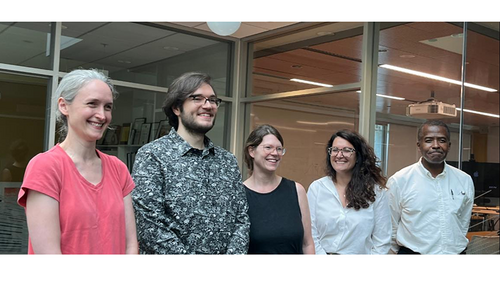
On July 15, 2024, Will Tyndall, graduate student in Physics and a member of Yale’s Wright Lab, successfully defended the thesis “Drone Calibration Systems for 21 cm Cosmology Experiments” (advisor: Laura Newburgh).
Tyndall explained, “We are developing drone-based beam calibration methods for large 21cm radio telescopes like CHIME. Providing this calibration measurement will improve the science results obtained by these surveys, which hope to measure the distribution of neutral hydrogen in the nearby (low-redshift) universe. During my dissertation research, we have created sophisticated radiofrequency instruments, written complicated software modules, and investigated creative measurement techniques to enhance the capabilities of our drone platform. “
Tyndall will next be a Postdoc at McGill University in Montreal, doing more 21cm instrumentation research.
Thesis Abstract: Measuring the cosmic distribution of neutral hydrogen across a wide redshift range is the long term goal of 21 cm intensity mapping experiments. Removing systematics adequately enough to measure this faint cosmological signal will require improvements to existing calibration techniques and the adoption of technical innovations. The Newburgh group is focused on improving the telescope beam calibration procedures for 21 cm radio interferometers, primarily through the use of drone based transmitters as calibration sources. This dissertation is comprised of an introduction to experimental cosmology, a literature review that reviews relevant topics in radio instrumentation and drone-based beam calibration, and three thesis chapters: The beamcals Module and HIRAX Analysis, Nearfield to Farfield Transformations and CHIME Analysis, and A Digital Noise Source for 21 cm Beam Mapping.

